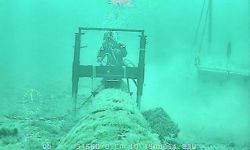Michigan regulators will consider climate change in Line 5 decision

- May 11: Michigan vows to seek Line 5 profits if Enbridge defies shutdown order
- On eve of Line 5 shutdown deadline, Enbridge vows to defy Michigan order
The fate of the Line 5 pipeline is officially a climate issue in the eyes of Michigan regulators.
The Michigan Public Service Commission on Wednesday ruled that it must consider evidence on greenhouse gas pollution caused by petroleum flowing through Line 5 as it decides whether Canadian oil giant Enbridge energy can relocate the pipeline inside of a tunnel designed to extend the pipeline’s life span in the Straits of Mackinac.

Pipeline opponents called the decision historic: It’s the first time Michigan regulators have factored greenhouse gas emissions into their scrutiny of a project’s environmental impacts under the Michigan Environmental Protection Act.
Related:
- Fish, propane, cash: Not everyone loves Enbridge generosity in the Straits
- Is the Line 5 tunnel a bridge to Michigan’s energy future or a bad deal?
- Canadian officials to Michigan Senate: Line 5 shutdown would wreck economy
- Gov. Whitmer offers propane plan for Upper Peninsula after Line 5 shutdown
“It makes clear that our understanding of what counts as pollution changes over time, and our agencies and courts need to change with that,” said Margrethe Kearney, a senior attorney with the Environmental Law & Policy Center, which fought to include a consideration of climate change as a factor in the commission’s ruling.
Enbridge, which had fought to keep climate change off the table, issued its own statement that did not address the commission’s climate findings. The statement said the company is “pleased” that commissioners rejected other attempts by its opponents to turn the commission’s deliberations into a review of the company’s entire pipeline system.
“Our aim is simple,” a company statement read. “To replace the two pipelines in the Straits with an even safer pipeline encased in a concrete tunnel well below the lakebed.”
The decision comes just weeks ahead of Gov. Gretchen Whitmer’s May 13 deadline for Enbridge to stop transporting petroleum through the existing lakebottom pipes — an order Enbridge has vowed to defy.
In hopes of extending the pipeline’s life amid public concern about the risk of an oil spill in the Straits from the 68-year-old lakebottom line, Enbridge wants to relocate a 4-mile segment of Line 5 inside of a concrete tunnel deep below the lakebed.
The commission, which regulates pipeline siting in Michigan, must decide whether Enbridge can move the pipeline into the proposed tunnel. Enbridge is also awaiting permits to build the tunnel itself.
As commissioners considered how broadly to scope their review of the relocation plan, environmentalists pushed them to weigh broad impacts of the pipeline, including its role as a conduit for environmentally damaging greenhouse gases. Enbridge, meanwhile, had urged the commission to take the narrowest possible view, considering only the immediate consequences of moving the pipeline.
An administrative law judge tasked with overseeing the case rejected environmentalists' arguments regarding climate impacts, prompting them to appeal directly to the three-member MPSC.
In their ruling Wednesday, commissioners concluded that greenhouse gas emissions are pollutants under Michigan’s keystone environmental law, the Michigan Environmental Protection Act. As such, they found, construction of the new segment can’t be separated from the oil that would flow through it.
Commissioners wrote that analyzing the environmental impacts of the pipeline but not the products moving through it would defy “common sense.”
Kate Madigan, director of the Michigan Climate Action Network, called the decision “a huge win for anyone who cares about climate change.”
In addition to forcing a conversation about Line 5’s climate impacts, Madigan said, the commission’s ruling provides an opportunity for pipeline opponents to seek access to tightly-guarded information about the products flowing through Line 5.
Limited available evidence makes clear that Line 5 is a conduit for earth-warming greenhouse gases, Madigan said, but “we have nationally renowned experts who are ready to take the numbers once we're able to get those, and calculate what the actual emissions would be.”
The commission’s ruling differs from the Michigan Department of Environment, Great Lakes and Energy’s January decision to grant key permits for the tunnel project.
In conjunction with that earlier decision, which fell upon different environmental statutes, EGLE released an FAQ document noting that “there is no statutory mechanism for EGLE to factor climate considerations into its review.”
Wednesday’s decision tees up a lengthy deliberative process not unlike a court case. Parties on all sides of the issue will present evidence and make arguments, hoping to sway the commission’s eventual decision. The process is expected to take months, if not more than a year.
Meanwhile, the clock is ticking on Whitmer’s shutdown order.
Lawyers for Enbridge and the state are locked in legal battle over the order, but a resolution to the case is unlikely anytime soon. Lawyers for the two sides have entered mediation, and held their first session last Friday. Lawyers told the court they plan to continue with two more sessions on April 28 and May 18.
Spokespeople for Whitmer did not immediately respond to a request for comment from Bridge Michigan, but have previously said the governor “stands behind” the shutdown order while offering no details about what actions it will take if Enbridge defies the order.
Michigan Environment Watch
Michigan Environment Watch examines how public policy, industry, and other factors interact with the state’s trove of natural resources.
- See full coverage
- Subscribe
- Share tips and questions with Bridge environment reporter Kelly House
Michigan Environment Watch is made possible by generous financial support from:
Our generous Environment Watch underwriters encourage Bridge Michigan readers to also support civic journalism by becoming Bridge members. Please consider joining today.
See what new members are saying about why they donated to Bridge Michigan:
- “In order for this information to be accurate and unbiased it must be underwritten by its readers, not by special interests.” - Larry S.
- “Not many other media sources report on the topics Bridge does.” - Susan B.
- “Your journalism is outstanding and rare these days.” - Mark S.
If you want to ensure the future of nonpartisan, nonprofit Michigan journalism, please become a member today. You, too, will be asked why you donated and maybe we'll feature your quote next time!






